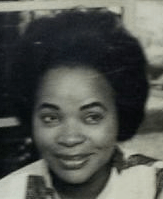Adaora Lily Ulasi

Adaora Lily Ulasi (born 1932) was a Nigerian journalist and novelist. As a journalist she has worked for the BBC and Voice of America. As a novelist she may have been the first Nigerian to write detective fiction in English, "adapting the genre of the crime thriller to a Igbo or Yoruba context".[1]
Biography
Born in Aba, Eastern Nigeria, daughter of an Igbo chief, she attended the local missionary school, but at the age of 15 was sent to the US to study. After graduating from high school she then studied at Pepperdine University and at the University of Southern California, earning a BA in journalism in 1954. She supplemented her income by writing the occasional newspaper column, working as a nanny and a film extra e.g. appearing in the 1953 film White Witch Doctor starring Susan Hayward and Robert Mitchum.
In the 1960s she was women's page editor of the Daily Times of Nigeria. She subsequently married Deryk James and had three children Heather, Angela and Martin. After her divorce in 1972 she went to Nigeria as editor of Woman's World magazine, and in 1976 returned to England. Her first novel, Many Thing You No Understand (1970), "controversially (for the first time) used pidgin English to dramatize the interaction between colonial officers and local people in the pre-independence era, as did her subsequent works, Many Thing Begin For Change (1971), Who Is Jonah? (1978) and The Man from Sagamu (1978). By contrast, The Night Harry Died (1974) is set in southern USA."[2]
She lived most recently in Canterbury, Kent.
Novels
- Many Thing You No Understand - London: Michael Joseph, 1970; Fontana, 1973
- Many Thing Begin For Change - London: Michael Joseph, 1971; Fontana, 1975
- The Night Harry Died - Lagos: Research Institute Nigeria, 1974
- Who Is Jonah? - Ibadan: Onibonoje Press, 1978
- The Man From Sagamu - London: Collins/Fontana, 1978; New York: Collier Macmillan, 1978
See also
- Nigerian women novelists
- Chimamanda Ngozi Adichie
- Buchi Emecheta
- Flora Nwapa
- Karen King-Aribisala
- Adaobi Tricia Nwaubani
- Taiwo Odubiyi
- Ifeoma Okoye
References
- ↑ Lorna Sage, ed., The Cambridge Guide to Women's Writing in English, 1999
- ↑ Margaret Busby (ed.), Daughters of Africa: An International Anthology of Words and Writings by Women of African Descent, London: Jonathan Cape, 1992, p. 422.